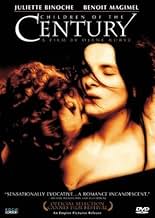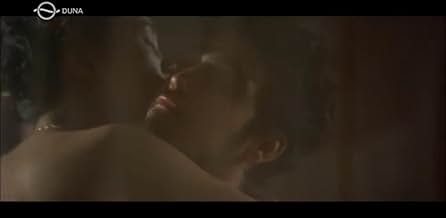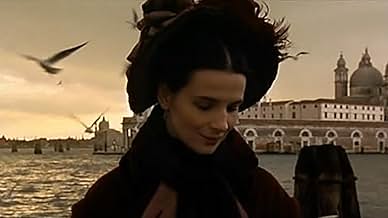Les enfants du siècle
- 1999
- 2h 15min
CALIFICACIÓN DE IMDb
6.5/10
2.1 k
TU CALIFICACIÓN
Una historia de pasión condenada entre dos escritores geniales del siglo XIX: la novelista George Sand y el poeta Alfred de Musset.Una historia de pasión condenada entre dos escritores geniales del siglo XIX: la novelista George Sand y el poeta Alfred de Musset.Una historia de pasión condenada entre dos escritores geniales del siglo XIX: la novelista George Sand y el poeta Alfred de Musset.
- Dirección
- Guionistas
- Elenco
Victoire Thivisol
- Solange
- (as Victoire)
- Dirección
- Guionistas
- Todo el elenco y el equipo
- Producción, taquilla y más en IMDbPro
Opiniones destacadas
Diane Kury's oppulent film is a mixed bag. In it's favour it features
real life lovers Juliette Binoche and Benoît Magimel on excellent
form. As Alfred de Musset Magimel gives us a young man
completely out of his mind on a cocktail of opium and absinthe. A
man deeply creative and talented, but unable to function as a
human being. Binoche's George Sand is a strong a determined
woman. The scene where she finds that Musset may die after
overdosing is wonderfully performed with passion and grandeur.
The film comes alive in her eyes. As filmed by Vilko Filac and
dressed by Christian La Croix, Binoche has never looked more
beautiful or sensual.
However Kurys' direction and her screenplay, co-written by
Francois Olivier Rousseau and Murray Head, lacks direction and
understanding of her period. The brothel scenes are particularly
over the top. Yet her direction of her actor is magnificent.
What is missing from Kurys' film most of all however is Sand and
Musset as writers, as creative masters. There is no sense of their
value in the film beyond their doomed love affair.
Les Enfants du Siecle is a mixed bag, but certainly worth a look.
real life lovers Juliette Binoche and Benoît Magimel on excellent
form. As Alfred de Musset Magimel gives us a young man
completely out of his mind on a cocktail of opium and absinthe. A
man deeply creative and talented, but unable to function as a
human being. Binoche's George Sand is a strong a determined
woman. The scene where she finds that Musset may die after
overdosing is wonderfully performed with passion and grandeur.
The film comes alive in her eyes. As filmed by Vilko Filac and
dressed by Christian La Croix, Binoche has never looked more
beautiful or sensual.
However Kurys' direction and her screenplay, co-written by
Francois Olivier Rousseau and Murray Head, lacks direction and
understanding of her period. The brothel scenes are particularly
over the top. Yet her direction of her actor is magnificent.
What is missing from Kurys' film most of all however is Sand and
Musset as writers, as creative masters. There is no sense of their
value in the film beyond their doomed love affair.
Les Enfants du Siecle is a mixed bag, but certainly worth a look.
Contrary to its title, this is not a movie about children in an unnamed century. Instead this movie is about the love/hate relationship between French writers Alfred Musset and George Sand. They are two souls who have a mutual and affectionate understanding of one another until a voyage to Italy reveals their true nature. Passion, envy, trust, betrayal and forgiveness are all brilliantly encompassed in the relationship between Musset and Sand.
I enoyed this movie, though some may find it dull and slow. You may need to be a die-hard romantic or like well-costumed period dramas to watch this movie. My harshest criticism for this film would be that of it's length and even though I enjoyed the turbulent relationship shown in this film, there were times when I thought that their affair had ended for good only for them to reconcile a few scenes later.
This movie is handsomely photographed with wonderful costumes by Christian LaCroix and most magnificent of all, the actors don't seem like they're acting at all. Juliette Binoche is spectacular, both beauitful and natural in her potrayal of Sand. Benoit Magimel is splendid as Alfred Musset. Don't expect historical accuracy, and if you're a romantic at heart, you will not be disappointed.
I enoyed this movie, though some may find it dull and slow. You may need to be a die-hard romantic or like well-costumed period dramas to watch this movie. My harshest criticism for this film would be that of it's length and even though I enjoyed the turbulent relationship shown in this film, there were times when I thought that their affair had ended for good only for them to reconcile a few scenes later.
This movie is handsomely photographed with wonderful costumes by Christian LaCroix and most magnificent of all, the actors don't seem like they're acting at all. Juliette Binoche is spectacular, both beauitful and natural in her potrayal of Sand. Benoit Magimel is splendid as Alfred Musset. Don't expect historical accuracy, and if you're a romantic at heart, you will not be disappointed.
Wonderful mise-en-scene of a true passion that turned out to a, damaging love to hate you syndrome especially for Musset. Georges and Musset, they can't do with nor without each other. Their love was the spring of their inspiration that triggered their talent but the problem was that this love could feed only one's inspiration at a time.
Wonderful pictures, acting and especially costume design capture us in the late 1880's France which was a very nice experience.
Wonderful pictures, acting and especially costume design capture us in the late 1880's France which was a very nice experience.
If you have any interest in French Romanticism, or romanticism in general, see this film. The story is taken from both Musset's & Sand's accounts of the affair that took place. If a film is to be made about a poet, use the poets feelings and even words at the most opportune times, this film does that, and then some. This film is well crafted, from every aspect of its making. The performances by Binoche & Magimel are both riveting and heart wrenching.
If this love were a battle, the filmmaker would most definitely taken the side of Sand. As the truth of this affair left Musset's heart dispirited until his death. Even his friends, like Eugene Delacroix, have said that his pen was a poison that infected his reader like a virus. But all histoire aside, as a film, this is an exquisite piece of work, that is both heart-breaking and entertaining. In the words of the central characters, "Shame on you, who are the first to show me treason. The horror and anger, which made me lose my reason."-Alfred de Musset "The angels are no more pure than the heart of a young man who loves truthfully."-George Sand
Above all watch this film and judge for yourself.
If this love were a battle, the filmmaker would most definitely taken the side of Sand. As the truth of this affair left Musset's heart dispirited until his death. Even his friends, like Eugene Delacroix, have said that his pen was a poison that infected his reader like a virus. But all histoire aside, as a film, this is an exquisite piece of work, that is both heart-breaking and entertaining. In the words of the central characters, "Shame on you, who are the first to show me treason. The horror and anger, which made me lose my reason."-Alfred de Musset "The angels are no more pure than the heart of a young man who loves truthfully."-George Sand
Above all watch this film and judge for yourself.
If Romanticism, as a movement, can be defined as an "infinite longing" which combines passion and erotic tension with death, despair, and the cycles of nature, then Kurys film portrayal is aptly named and her protagonists--Alfred de Musset and Georges Sand--are indeed children of their century.
The key to understanding the point of this film is to think of it as a painting. It does not give you an insider's view of the relationship between these two literary giants; it does not break down their psychology; and you do not even understand why you, as an audience member, should like either of them. Yet their obsessive love was a monument for the first major artistic movement of the 19th century. Kurys paints them as Delacroix would--in all their lurid color, capturing the details of high emotion without explaining a thing. As painting on film, Les Enfants succeeds as wildly as any Romantic dreamscape and, thus, captures the mood of that era and the sentiment which spawned it more perfectly than 1,000 words on the subject.
The key to understanding the point of this film is to think of it as a painting. It does not give you an insider's view of the relationship between these two literary giants; it does not break down their psychology; and you do not even understand why you, as an audience member, should like either of them. Yet their obsessive love was a monument for the first major artistic movement of the 19th century. Kurys paints them as Delacroix would--in all their lurid color, capturing the details of high emotion without explaining a thing. As painting on film, Les Enfants succeeds as wildly as any Romantic dreamscape and, thus, captures the mood of that era and the sentiment which spawned it more perfectly than 1,000 words on the subject.
¿Sabías que…?
- TriviaGeorge Sand's estate loaned the production some of Sand's jewelry, including a sapphire ring, which Juliette Binoche wears throughout the film.
- Citas
George Sand: Love does exist, it's not an illusion. One merely has to recognise it, and be humble before it.
- Versiones alternativasThe original French theatrical version, which runs at 135 mins begins as Sand plans to leave her husband and Musset's father dies. This version continues after their final meeting as Sand begins to write her story and attempts in vain to see Musset one last time. This version ends with a direct to camera address by Sand at Musset's tomb. A shorter theatrical version was released in Germany, Spain, UK and US which begins with Sand reading from "Lélia" and ends with Sand and Musset's final meeting. It runs at 105 mins. This version contains two new scenes: Sand and Musset being introduced to each other and a dance sequence. However the opening sequences featuring Sands arrival in Paris during an uprising and her relationship with Marie Dorval are lost, as are the closing scenes as she attempts to see Musset a final time. Most DVD releases have favored the Original 135 min version which was more critically popular.
- ConexionesVersion of La canción inolvidable (1945)
Selecciones populares
Inicia sesión para calificar y agrega a la lista de videos para obtener recomendaciones personalizadas
- How long is Children of the Century?Con tecnología de Alexa
Detalles
- Fecha de lanzamiento
- País de origen
- Sitio oficial
- Idioma
- También se conoce como
- Children of the Century
- Locaciones de filmación
- Productoras
- Ver más créditos de la compañía en IMDbPro
Taquilla
- Total en EE. UU. y Canadá
- USD 56,611
- Fin de semana de estreno en EE. UU. y Canadá
- USD 8,044
- 15 sep 2002
- Total a nivel mundial
- USD 381,624
- Tiempo de ejecución
- 2h 15min(135 min)
- Color
- Mezcla de sonido
- Relación de aspecto
- 2.35 : 1
Contribuir a esta página
Sugiere una edición o agrega el contenido que falta



































